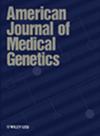Alessandro Serretti, Roberta Lilli, Cristina Lorenzi, Enrico Lattuada, Enrico Smeraldi
下载PDF
{"title":"DRD4 exon 3 variants associated with delusional symptomatology in major psychoses: A study on 2,011 affected subjects","authors":"Alessandro Serretti, Roberta Lilli, Cristina Lorenzi, Enrico Lattuada, Enrico Smeraldi","doi":"10.1002/ajmg.1321","DOIUrl":null,"url":null,"abstract":"<p>We previously reported an association of DRD4 exon3 long allele variants with delusional symptomatology independently from diagnoses. The aim of this investigation was to study DRD4 in major psychoses and to test the association in a larger sample. We studied 2,011 inpatients affected by bipolar disorder (n = 811), major depressive disorder (n = 635), schizophrenia (n = 419), delusional disorder (n = 104), psychotic disorder not otherwise specified (n = 42), and 601 healthy controls. A subsample of 1,264 patients were evaluated using the OPCRIT checklist and differences of symptomatology factor scores among genetic variants were assessed using one-way analysis of variance (ANOVA). DRD4 allele and genotype frequencies in bipolars, schizophrenics, delusionals, and psychotic NOS were not significantly different from controls; major depressives showed a trend toward an excess of DRD4*Short and DRD4*Short/Short variants versus controls. The ANOVA on factor scores in the whole subsample of 1,264 subjects showed a significant difference on delusion factor in allele analysis (<i>P</i> = 0.007), and in genotype one (<i>P</i> = 0.018), with DRD4*Long containing variants associated with severe symptomatology. The analysis in the replication subjects only (n = 803) showed a trend in the same direction, though not reaching the significance level. This analysis in an enlarged sample suggests that DRD4*Long alleles exert a small but significant influence on the delusional symptomatology in subjects affected by major psychoses. © 2001 Wiley-Liss, Inc.</p>","PeriodicalId":7507,"journal":{"name":"American Journal of Medical Genetics Part A","volume":"105 3","pages":"283-290"},"PeriodicalIF":1.7000,"publicationDate":"2001-04-05","publicationTypes":"Journal Article","fieldsOfStudy":null,"isOpenAccess":false,"openAccessPdf":"https://sci-hub-pdf.com/10.1002/ajmg.1321","citationCount":"69","resultStr":null,"platform":"Semanticscholar","paperid":null,"PeriodicalName":"American Journal of Medical Genetics Part A","FirstCategoryId":"99","ListUrlMain":"https://onlinelibrary.wiley.com/doi/10.1002/ajmg.1321","RegionNum":4,"RegionCategory":"生物学","ArticlePicture":[],"TitleCN":null,"AbstractTextCN":null,"PMCID":null,"EPubDate":"","PubModel":"","JCR":"Q3","JCRName":"GENETICS & HEREDITY","Score":null,"Total":0}
引用次数: 69
引用
批量引用
Abstract
We previously reported an association of DRD4 exon3 long allele variants with delusional symptomatology independently from diagnoses. The aim of this investigation was to study DRD4 in major psychoses and to test the association in a larger sample. We studied 2,011 inpatients affected by bipolar disorder (n = 811), major depressive disorder (n = 635), schizophrenia (n = 419), delusional disorder (n = 104), psychotic disorder not otherwise specified (n = 42), and 601 healthy controls. A subsample of 1,264 patients were evaluated using the OPCRIT checklist and differences of symptomatology factor scores among genetic variants were assessed using one-way analysis of variance (ANOVA). DRD4 allele and genotype frequencies in bipolars, schizophrenics, delusionals, and psychotic NOS were not significantly different from controls; major depressives showed a trend toward an excess of DRD4*Short and DRD4*Short/Short variants versus controls. The ANOVA on factor scores in the whole subsample of 1,264 subjects showed a significant difference on delusion factor in allele analysis (P = 0.007), and in genotype one (P = 0.018), with DRD4*Long containing variants associated with severe symptomatology. The analysis in the replication subjects only (n = 803) showed a trend in the same direction, though not reaching the significance level. This analysis in an enlarged sample suggests that DRD4*Long alleles exert a small but significant influence on the delusional symptomatology in subjects affected by major psychoses. © 2001 Wiley-Liss, Inc.
重度精神病患者与妄想症状相关的DRD4外显子3变异:2011名受影响受试者的研究
我们之前报道了DRD4外显子3长等位基因变异与独立于诊断的妄想症状的关联。本研究的目的是研究DRD4在主要精神病中的作用,并在更大的样本中检验其相关性。我们研究了2011名住院患者,包括双相情感障碍(n = 811)、重度抑郁症(n = 635)、精神分裂症(n = 419)、妄想障碍(n = 104)、未指明的精神障碍(n = 42)和601名健康对照。使用OPCRIT检查表对1,264例患者的亚样本进行评估,并使用单因素方差分析(ANOVA)评估遗传变异之间症状学因素评分的差异。双相情感障碍患者、精神分裂症患者、妄想症患者和精神病性NOS患者的DRD4等位基因和基因型频率与对照组无显著差异;与对照组相比,重度抑郁症患者表现出DRD4*Short和DRD4*Short/Short变体过量的趋势。对1264名受试者全亚样本的因子得分进行方差分析,等位基因分析中妄想因子(P = 0.007)和基因型1 (P = 0.018)差异有统计学意义,DRD4*Long包含变异与严重症状相关。仅复制受试者(n = 803)的分析显示出相同方向的趋势,但未达到显著性水平。在扩大的样本中进行的分析表明,DRD4*长等位基因对受主要精神病影响的受试者的妄想症状有微小但显著的影响。©2001 Wiley-Liss, Inc。
本文章由计算机程序翻译,如有差异,请以英文原文为准。

 求助内容:
求助内容: 应助结果提醒方式:
应助结果提醒方式:


